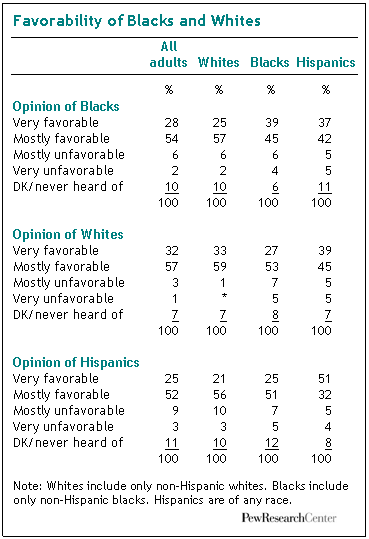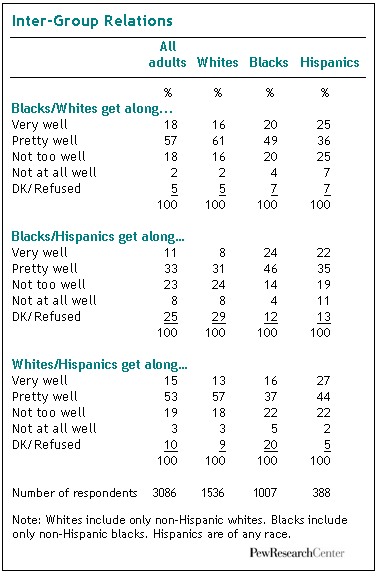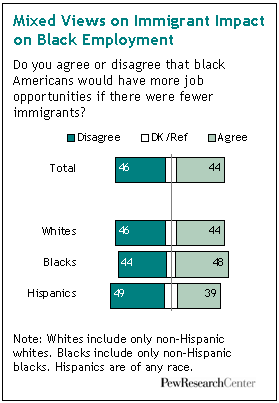Race, ethnicity and politics can sometimes make for a volatile mix, as the presidential field of 2008 has begun to discover. But in the world beyond politics, race relations in this country are on a pretty even keel. So say the real experts — the people themselves.
 A major Pew Research survey of racial attitudes taken this past fall found that whites, blacks and Hispanics all have generally favorable opinions of one another and all tend to see inter-group relations in a more positive than negative light.1 There are some differences in these attitudes by race, ethnicity, age, social-economic status and geography — but these tend to be small. The overall portrait of race relations is one of moderation, stability and modest progress.
A major Pew Research survey of racial attitudes taken this past fall found that whites, blacks and Hispanics all have generally favorable opinions of one another and all tend to see inter-group relations in a more positive than negative light.1 There are some differences in these attitudes by race, ethnicity, age, social-economic status and geography — but these tend to be small. The overall portrait of race relations is one of moderation, stability and modest progress.
The telephone survey was taken from Sept. 5 through Oct. 6, 2007 among a nationally-representative sample of 3,086 adults. Among its key findings:
Group favorability:
Among whites, blacks and Latinos, about eight-in ten in each group say they have a very or mostly favorable impression of members of the other two groups. These favorability ratings have been largely stable over the past two decades. Smaller percentages of each group — generally about one-in-four — say they have a “very favorable” view of members of the other two groups. These “very favorable” ratings have trended upward a bit since 1990, especially among whites. For example, some 25% of whites now express a “very favorable” view of blacks, compared with just 17% in 1990. Some 27% blacks say they have a very favorable view of whites; this figure is virtually unchanged from 1990, when it was 26%. Meantime, the overall favorability ratings that Latinos give to both whites (84%) and blacks (79%) are reciprocated in kind — 77% of whites and 76% of blacks say they have a very or mostly favorable opinion of Latinos.
 Inter-Group relations:
Inter-Group relations:
Solid majorities of blacks, whites and Hispanics say their group is getting along pretty well or very well with members of the other groups. For example, 77% of whites say blacks and whites get along very or pretty well; and 69% of blacks say the same thing. Also, 70% of whites say whites and Hispanics get along very or pretty well, and 71% of Hispanics agree.
However, assessments about black-Hispanic relations are somewhat less positive. While 70% of blacks say blacks and Hispanics get along very or pretty well, just 57% of Hispanics agree. Meantime, some 30% of Hispanics say blacks and Hispanics get along not too or not at all well; this is the most negative assessment registered by any group in the survey about any inter-group relationship. Notably, just 18% of blacks agree with this negative view of black-Latino relations — a share that is smaller than the share of blacks (24%) who see black-white relations in a negative light.
Socio-economic patterns:
Adults with a college education and/or higher incomes are slightly more inclined than those who have not completed high school and have lower incomes to express a favorable view of people of a different race than their own.
 Geographic patterns:
Geographic patterns:
Blacks who live in rural areas are more likely than those who live in cities or suburbs to express a favorable view of whites. This pattern does not hold for whites — that is, whites who live in rural areas are no different from those who live in urban or suburban areas in their attitudes toward blacks. Also, there is virtually no difference by region (South, East, Midwest and West) either in the way whites view blacks or in the way blacks view whites.
Patterns within the groups:
Attitudes about the state of race relations are more varied among both Hispanics and blacks than they are among whites. Greater percentages of both Hispanics and blacks than whites choose both the “very well’ and the “not too well” responses to the question about how well these groups get along with whites. Whites are more likely than the other two groups to settle on the “pretty well’ response — both to the question about black/white relations and to the question about Hispanic/white relations.
Age patterns:
Among blacks, judgments about black-white relations vary among age groups, with younger black adults tending to be more downbeat. Some 30% of 18-to-29 year old blacks say that blacks and whites get along “not too well,” compared with just 20% of all black adults and just 13% of blacks ages 65 and older who say the same thing.
 Immigration, jobs, blacks and Latinos:
Immigration, jobs, blacks and Latinos:
One potential flash point in group relations is competition over jobs, especially between immigrants — a population that is heavily Latino — and blacks — a population that has high levels of unemployment. The Pew survey found moderation on this front, however. Blacks, Hispanics and whites are all roughly evenly divided on the question of whether blacks would have more job opportunities if there were fewer immigrants. Just under half of each group agrees with that statement, while about the same number disagrees.
Notably, black attitudes on this question have softened in the past two decades. Back in 1986, fully 74% of blacks agreed that blacks would have more job opportunities if there were fewer immigrants. Today, despite high levels of immigration in the ensuing two decades, just 48% of blacks hold this view.
Some of my best friends:
The vast majority of adults in this country say they know a person of a different race whom they consider a friend. Nearly nine-in-ten (87%) whites and three quarters (72%) of white Hispanics say they have a friend who is black. Some 82% of blacks say they have a friend who is white. However, a plurality of whites (45%), blacks (35%) and Hispanics (39%) say they have “just a few” friends of a different race.


